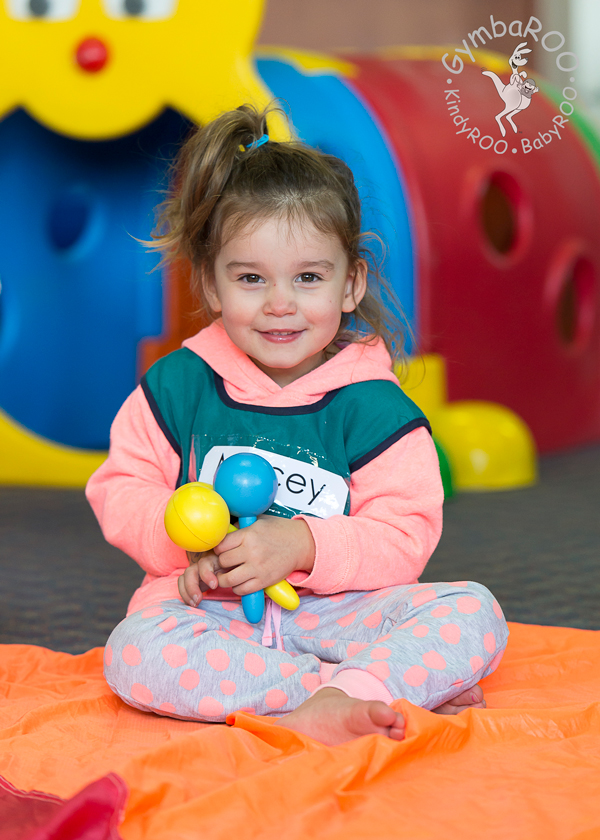Join the thousands of parents already raising smarter, happier babies with our online baby classes: The Active Babies Smart Kids series. Click here.
GymbaROO-KindyROO kids are excelling academically, emotionally, in leadership roles and on the sporting field. Find us at: GymbaROO-KindyROO
Dr Jane Williams and Bindy Cummings
Long suspected, but never proven, research now shows that: ‘Early musical training can produce long-lasting changes in behaviour and on the brain’.
In this study1, 36 highly skilled musicians were tested. The musician group was then split equally between those who had learned music before the age of seven and those who had learned after the age of seven.
The researchers found that despite the fact that the 36 highly skilled musicians had done similar amounts of training and practice, the group who had learned music before the age of seven had more extensive wiring of the corpus callosum. This is the area of the brain which links the two hemispheres together and plays an important role in connecting vital areas of the brain to each other. It is also suggested that the corpus callosum plays a fundamental role in integrating information and helping sort out complex behaviours2.
What this means is that if a child starts to play an instrument before the age of seven, they have more chance of developing those areas of the brain more fully than if they did not learn to play an instrument.
It’s great to have research that proves there is real value learning music at young ages while the brain is still developing, something we have attested to for 30 years at GymbaROO. In the words of the researchers: “Training before the age of 7 years results in changes (in the brain) that may serve as a scaffold upon which ongoing experience can build”. Playing instruments does not have to wait until your child starts school. Before the age of three years simple instruments such as the triangle, maracas and the rhythm sticks enable your child’s brain to put in place the foundational pathways for later, more complex learning.
Once the brain has lateralised (the two sides can do independent action), usually at about three years of age, then a child can potentially learn more complex instruments such as the violin or piano.
You will find lots of ideas and activities for using rhythm and music to help your child’s developing brain at GymbaROO and KindyROO and in our online baby classes here.
Dr Jane Williams (PhD, BMgt, RN(Paeds)) is the Research and Education General Manager for GymbaROO and KindyROO. Dr Williams is one of Australia’s leading experts on baby and child development. More on Dr Williams here.
Bindy Cummings (B.Ed(Human Movement) Hons) has worked as a teacher, child development consultant, early childhood development lecturer, teacher trainer and INPP & iLS consultant. She is the co-creator of GymbaROO’s Active Babies Smart Kids online series, has authored many published articles on child development. She is working on the content and development GymbaROO’s portal and online training programs, and the creation of new online programs for parents and children. More on Bindy Cummings here.
GymbaROO Images by Studio Z Photography
1. Steele C. J., Bailey, J. A. Zatorre, R. J. & Penhune, V. B. (2013). Early Musical Training and White-Matter Plasticity in the Corpus Callosum: Evidence for a Sensitive Period. The Journal of Neuroscience, 33(3), pp1282-1290; doi:10.1523/JNEUROSCI.3578-12.2013 2. Hinkley, L. B. N. & Marco, E. J. et al. (2012). The Role of Corpus Callosum Development in Functional Connectivity and Cognitive Processing PLOS One DOI: 10.1371/journal.pone.0039804
Active Babies Smart Kids – Online Baby Classes
GymbaROO-KindyROO’s online series of baby classes is taking the parenting world by storm! It is highly recommended by doctors, paediatricians, early childhood experts and the Maternal Child and Family Health Nurses Association. This series is being called: “The essential guide for parents”. Join the thousands of parents already playing with their babies from birth, in the best way for brain and body development and laying crucial foundations for future learning. What happens in the first year, not only matters, it matters a lot!
Active Babies Smart Kids BabyROO series – Click here.
Try the first class FREE! Click here to watch our Active Babies Smart Kids Episode 1 – Tummy Time
GymbaROO-KindyROO
Thousands of parents, babies and children are presently involved in our programs and creating rising stars. GymbaROO-KindyROO kids are excelling academically, emotionally, in leadership roles and on the sporting field. Come join all the fun and learning! “GymbaROO – The best decision I ever made for my child.” Classes from 6 weeks old – 7 years GymbaROO KindyROO
Enjoy the following GymbaROO-KindyROO articles
GymbaROO-KindyROO: Who, what, where, why and how
All about GymbaROO-KindyROO’s online baby classes for parents and babies: Active Babies Smart Kids
How to raise a smarter, happier baby
Why active babies make smart kids
Become a GymbaROO-KindyROO franchisee
Important reasons to teach your baby / child to ‘keep the beat’
My baby’s got rhythm. Musical activities to share with your baby.
Six benefits of nursery rhymes
Click here for more GymbaROO-KindyROO article choices


